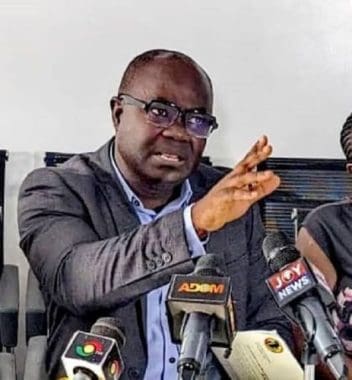
The Traders Advocacy Group Ghana (TAGG) has levelled serious allegations against some operatives of the Ghana Customs Service in the Ashanti Region, accusing members of the regional task force of engaging in systematic extortion of importers and business owners.
Addressing journalists at a press conference in Accra on Tuesday, TAGG President, David Kwadwo Amoateng, said the extortion racket—which the group claims has persisted across political administrations—is undermining business confidence, harming trade, and threatening the credibility of the current government’s efforts to reform the country’s revenue collection systems.
According to TAGG, a task force originally introduced to provide additional checks on containers cleared at the ports has now become “an extortion force,” allegedly demanding payments from importers under the guise of enforcing proper valuations.
“We welcomed the task force in good faith, believing it would ensure fairness,” Amoateng said. “However, it has become a tool for intimidation and illegal collections. We are very concerned that monies taken from these traders are allegedly transported back to Accra to create a false impression of improved revenue performance.”
Case of Alleged GHS 40,000 Extortion
TAGG cited a recent incident involving a Customs officer identified as Prince Daniels Mensah Odai, also known as Prince, who is said to have intercepted two containers enroute to Kumasi on October 21, 2025.
The importer, who had already cleared four containers and paid the required duties in Accra, was allegedly accused of undervaluation by the officer. TAGG claims the officer initially demanded GHS 120,000, but after negotiations, he allegedly settled on GHS 40,000, which was reportedly paid through mobile money and cash.
Days later, after learning that the incident had been reported to TAGG and was being investigated, the officer is said to have paid the GHS 40,000 into government coffers in an attempt to “cover his tracks.”
“This is only one case we have tracked. How many more importers have suffered similar treatment from the same officer or other task force members?” Amoateng asked.
A Systemic Failure, Not an Isolated Case
TAGG leaders stressed that the alleged incident highlights deeper systemic failures within Ghana Customs, arguing that extortion and “forced recoveries” have become entrenched practices conducted under the guise of boosting government revenue.
General Secretary Nana Poku noted that such activities contributed significantly to the previous government’s unpopularity, warning that the pattern is resurfacing under the new administration.
“When traders are frustrated and the business community suffers, no government can maintain support,” he said. “We see signs of the same harmful practices re-emerging, especially during this transition period when systems are being reorganized.”
TAGG also anticipates a rebuttal from Customs, possibly showcasing revenue figures from the task force. However, the group insists such data “may be misleading” and does not address how those funds were allegedly obtained.
Demands to Government
Calling on the Mahama-led NDC government to take decisive action, TAGG issued a four-point demand:
1. Immediate investigation into Officer Prince Daniels Mensah Odai and the operations of the Ashanti Region Customs Task Force.
2. Comprehensive audit of all Customs task forces, including their usefulness and oversight mechanisms.
3. Implementation of transparent valuation procedures to eliminate arbitrary assessments and extortion.
4. Creation of an independent reporting channel for traders facing extortion or corruption.
TAGG leaders emphasized that if the current administration fails to address these issues promptly, it risks repeating the governance and public trust challenges of the past.
“We sounded the alarm under the previous Commissioner, Mr. Seidu, but no action was taken. The consequences were clear in the elections,” Amoateng said. “We urge this government not to repeat those mistakes.”
The group concluded by reaffirming its commitment to protect Ghanaian traders and ensure the creation of a fair, corruption-free trading environment.
